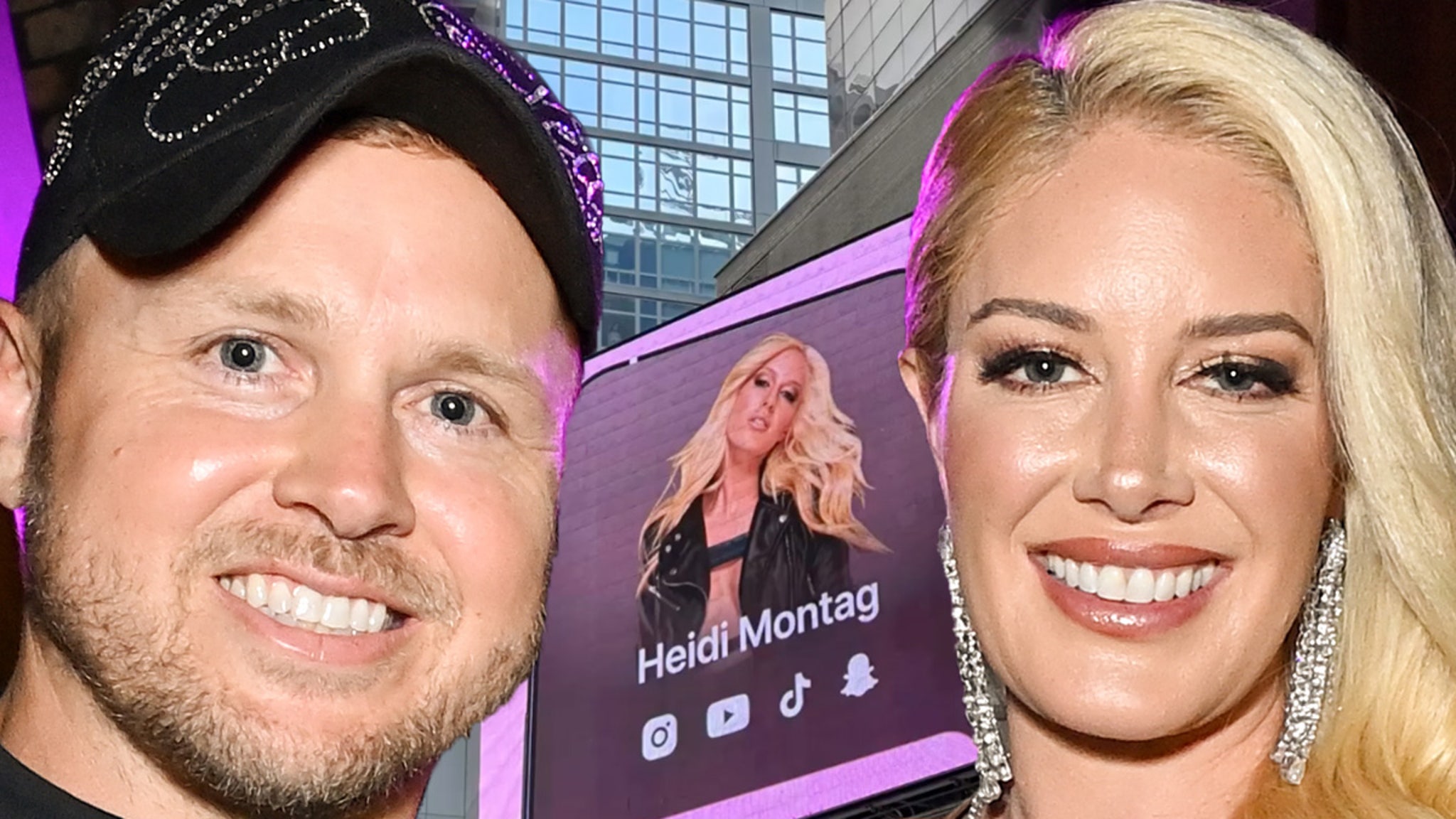Business
Leon Black Agreed to Pay $62.5 Million to Settle Epstein-Related Claims

The billionaire investor Leon Black agreed to pay $62.5 million to the U.S. Virgin Islands in January to be released from any potential claims arising out of the territory’s three-year investigation into the sex trafficking operation of the disgraced financier Jeffrey Epstein, according to a copy of the settlement agreement.
The previously undisclosed settlement came after the Virgin Islands reached a $105 million deal in November with Mr. Epstein’s estate. The next month, the territory sued JPMorgan Chase in federal court over the bank’s 15-year relationship with Mr. Epstein, a registered sex offender who killed himself in a Manhattan jail cell in 2019.
The Virgin Islands government produced its settlement agreement with Mr. Black in response to a public records request by The New York Times. In January, representatives of the two parties held a private mediation session to settle claims, according to another document reviewed by The Times. The $62.5 million settlement followed that session. Mr. Black agreed to pay in cash, according the settlement document.
The settlement shows the extent to which Mr. Black, once a titan of the private equity industry, has gone to limit scrutiny of his decades-long social and business ties to Mr. Epstein. Those dealings, including the revelation that he paid $158 million to Mr. Epstein for tax and estate planning services, had become a source of embarrassment for Mr. Black in the years after Mr. Epstein’s death.
Mr. Black, 71, was forced to step down in early 2021 as chairman and chief executive of Apollo Global Management, the giant private equity firm he co-founded in 1990. A major art collector who made news for his $120 million purchase of a version of Edvard Munch’s “The Scream,” Mr. Black also stepped down as chairman of the Museum of Modern Art in New York.
The four-page settlement said nothing in it should be construed as an “admission of liability” by Mr. Black.
Venetia H. Velazquez, a lawyer with the Virgin Islands attorney general’s office, which negotiated the settlement, said, “For the past several years, the Virgin Islands Department of Justice has made it a priority to support human trafficking victims and to enforce the law to prevent and deter human trafficking.”
Whit Clay, a spokesman for Mr. Black, said: “Mr. Black engaged and made payments to Jeffrey Epstein for legitimate financial advisory services, which, based on everything now known, he very much regrets. Consistent with settlements of other major U.S. banks, Mr. Black resolved the U.S.V.I.’s potential claims arising out of the unintended consequences of those payments. There is no suggestion in the U.S.V.I. settlement that Mr. Black was aware of or participated in any misconduct.”
The settlement occurred after a scheduled two-day mediation attended by lawyers for Mr. Black and the Virgin Islands, as well as a plaintiffs’ lawyer who had represented many of Mr. Epstein’s victims, according to the document reviewed by The Times.
Brad Edwards, the plaintiffs’ lawyer, said he was “not at liberty to discuss the topic.”
Mr. Epstein killed himself in August 2019 while being held in federal custody in Manhattan on sex trafficking charges. Lawyers for Mr. Epstein’s victims have said at least 200 women — many of them teenagers at the time — were sexually abused by Mr. Epstein at his private island residence in the Virgin Islands, as well as his homes in Manhattan, Florida and elsewhere.
Some victims of Mr. Epstein who had received settlements directly from his estate were granted permission by the estate’s executors to pursue claims against a handful of men who had socialized with Mr. Epstein, according to a person with knowledge of the matter. Mr. Black was one of those men, the person said.
The settlement with the Virgin Islands did not cover claims anyone else might have against Mr. Black. But the settlement itself could not be used as “evidence of wrongdoing by Black,” the document said.
The Virgin Islands’ investigation of Mr. Black arose from an inquiry that led to the $105 million settlement with Mr. Epstein’s estate and the territory’s pending lawsuit against JPMorgan Chase. The territory had been weighing a suit that would have accused Mr. Black of facilitating Mr. Epstein’s sex trafficking operation by paying large sums of money to Southern Trust, which was one of Mr. Epstein’s main companies in the Virgin Islands, said two people briefed on the matter.
Mr. Black’s decision to step down at Apollo followed an article in The Times that reported his ties to Mr. Epstein were more extensive than previously known. Apollo subsequently hired the law firm Dechert to investigate Mr. Black’s relationship with Mr. Epstein. Dechert cleared Mr. Black of any wrongdoing. But the law firm found Mr. Black had paid $158 million to Southern Trust and also provided the business with a $30 million loan.
In its report, Dechert noted that the compensation paid by Mr. Black to Mr. Epstein, a college dropout, “far exceeded any amounts” paid to his other professional advisers.
Planning for the mediation session with Mr. Black began in December while Denise N. George was still attorney general of the Virgin Islands. But she was fired on New Year’s Eve by the governor of the U.S. territory — Albert Bryan Jr. — just days after her office sued JPMorgan.
In its lawsuit against JPMorgan, the Virgin Islands claims that the nation’s largest bank turned a blind eye to Mr. Epstein’s trafficking of teenage girls and young women for sex. It is seeking $190 million in penalties.
JPMorgan, which recently reached a $290 million settlement with Mr. Epstein’s victims on similar grounds, is opposing the lawsuit filed by the Virgin Islands. The bank claims the territory should not be entitled to any money from it because government officials did little to deter Mr. Epstein’s activities.
In 2013, JPMorgan dropped Mr. Epstein as a customer, after years of red flags raised by bank compliance employees about it doing business with a registered sex offender, according to court filings in the lawsuit.
But other documents reviewed by The Times show that several bank employees continued to talk to Mr. Epstein after 2013 because of his role as a tax adviser to Mr. Black, who had also been a customer of JPMorgan’s private bank. These documents also show that the decision to continue to work with Mr. Epstein because he was Mr. Black’s adviser was approved by top executives at the bank.
Ms. Velazquez said in her statement, “Unlike any single individual, JPMorgan had detailed and comprehensive financial data on Epstein’s activities and a legal obligation to share that information with law enforcement.”
A JPMorgan spokeswoman said any meeting that bank employees had with Mr. Epstein after 2013 would have been in service of his clients.
Some of the settlement money will go toward mental health programs and to combat sex trafficking on the Virgin Islands, the territory’s attorney general’s office said.
Jessica Silver-Greenberg and Maureen Farrell contributed to this report.

Business
California drops zero-emission truck rules after inaction by Biden's EPA

California government’s plan to phase out heavy-duty diesel trucks and diesel locomotives has been derailed.
The ambitious plan aimed at reducing local pollution and global greenhouse gases required special waivers from the federal government. The Biden administration hadn’t granted the waivers as of this week, and rather than face almost certain denial by the incoming Trump administration, the state withdrew its waiver request.
That means the far-reaching regulations issued by the California Air Resources Board in 2022 to ban new diesel truck sales by 2036 and force fleet owners to take them off the road by 2042 won’t be enforced. Known as the Advanced Clean Fleets rule, the idea was to replace those trucks with electric and hydrogen-powered versions, which dramatically reduce emissions but are currently two to three times more expensive.
“While we are disappointed that U.S. EPA was unable to act on all the requests in time, the withdrawal is an important step given the uncertainty presented by the incoming administration that previously attacked California’s programs to protect public health and the climate and has said will continue to oppose those programs,” CARB Chair Liane Randolph said in a prepared statement.
Environmentalists reacted with deep disappointment.
“To meet basic standards for healthy air, California has to shift to zero-emissions trucks and trains in the coming years. Diesel is one of the most dangerous kinds of air pollution for human health,” Paul Cort, director of Earthjustice’s Right to Zero campaign, said in a prepared statement. “We’ll be working tirelessly in the coming years — and calling on Gov. [Gavin] Newsom, state legislators, and our air quality regulators to join us — to clean up our freight system and fix the mess [U.S.] EPA’s inaction has created.”
The trucking industry is pleased at the result, but hopes to continue working with California on environmental issues.
“This rule was flawed, and was not reflective of reality,” said Matt Schrap, chief executive at the Harbor Trucking Assn. “Ideally this is an opportunity to take a step back and look at a program that would be more sustainable.”
Trucking representatives had filed a lawsuit to block the rules, arguing they would cause irreparable harm to the industry and the wider economy. Train operators said no zero-emission locomotives exist on the commercial market.
Schrap said “the most important thing is the EPA could have issued the waiver and they didn’t.”
The EPA said it acknowledges California’s withdrawal of the waiver requests “and as a result is taking no further action on CARB’s prior requests and considers these matters closed.”
President-elect Donald Trump is a champion of the fossil fuel industry, making it unlikely that his administration would have approved the California waivers. The state could, however, pursue waivers at some point in the future.
Under the federal Clean Air Act, California is allowed to set its own air standards, and other states are allowed to follow California’s lead. But federal government waivers are required. Most of California’s waivers have been granted, including approval in December of a California ban on new sales of gas-powered cars and light trucks by 2035.
Business
Elon Musk, Mark Zuckerberg and Jeff Bezos to Attend Trump’s Inauguration

Bezos, Zuckerberg and Coke at the inauguration
Corporate America had already raced to donate big sums to Donald Trump’s record-breaking inaugural fund. Now some of its leaders appear eager to jockey for prominent positions at the inauguration next week.
It’s a new reminder that for some of the nation’s biggest businesses, forging close ties to a president-elect who is promising hard-hitting policies like tariffs is a priority this time around.
Jeff Bezos and Mark Zuckerberg are expected to be on the inauguration dais, according to NBC News, alongside Elon Musk and several cabinet picks.
The presence of Musk isn’t a surprise, given the Tesla chief’s significant support of and huge influence over Trump. But the other tech moguls have only more recently been seen as supporters of the administration. (Indeed, Bezos frequently sparred with Trump during his first presidential term.)
It’s the latest effort by Bezos and Zuckerberg to burnish their Trump credentials. At the DealBook Summit in December, Bezos — whose Amazon has faced scrutiny under the Biden administration and whose Blue Origin is hoping to win government rocket contracts — said that he was “very hopeful” about Trump’s efforts to reduce regulation.
And Zuckerberg recently announced significant changes to Meta’s content moderation policy, including relaxing restrictions on speech seen as protecting groups including L.G.B.T.Q. people that won praise from Trump and other conservatives. On the inauguration front, Zuckerberg is also co-hosting a reception alongside the longtime Trump backers Miriam Adelson, Tilman Fertitta and Todd Ricketts.
Both tech moguls have visited Mar-a-Lago since the election, with Zuckerberg having done so more than once.
Coca-Cola took a different tack. The drinks giant’s C.E.O., James Quincey, gave Trump what an aide called the “first ever Presidential Commemorative Inaugural Diet Coke bottle.”
More broadly, business leaders want a piece of the inauguration action. The Times previously reported that the Trump inaugural fund had surpassed $170 million, a record, and that even major donors have been wait-listed for events.
Others are throwing unofficial events around Washington, including an “Inaugural Crypto Ball” that will feature Snoop Dogg, with tickets starting at $5,000, The Wall Street Journal reports.
It’s a reminder that C.E.O.s are reading the room, and preparing their companies for a president who has proposed creating an “External Revenue Service” to oversee what he has promised will be wide-ranging tariffs.
David Urban, a longtime Trump adviser who’s hosting a pre-inauguration event, told The Journal, “This is the world order, and if we’re going to succeed, we need to get with the world order.”
-
In other Trump news: The president-elect is expected to appear via videoconference at the World Economic Forum in Davos, Switzerland, which starts on Inauguration Day, according to Semafor.
HERE’S WHAT’S HAPPENING
Investors brace for the latest inflation data. The Consumer Price Index report, due out at 8:30 a.m. Eastern, is expected to show that inflation ticked up last month, most likely because of climbing food and fuel costs. Global bond markets have been rattled as slow progress on slowing inflation has prompted the Fed to slash its forecast for interest rate cuts.
More Trump cabinet picks will appear before the Senate on Wednesday. Senator Marco Rubio of Florida, the choice for secretary of state, is expected to field questions about his views on the Middle East, Ukraine and China, but is expected to be confirmed. Russell Vought, the pick to run the Office of Management and Budget, will most likely be asked about his advocacy for drastically shrinking the federal government, a key Trump objective. And Sean Duffy, the Fox Business host chosen to lead the Transportation Department, will probably face questions on how he would oversee matters including aviation safety and autonomous vehicles, the latter of which is a priority for Elon Musk.
Meta plans to lay off another 5 percent of its employees. Mark Zuckerberg, the tech giant’s C.E.O., told staff members to prepare for “extensive performance-based cuts” as the company braces for “an intense year.” The social media giant faces intense competition in the race to commercialize artificial intelligence.
A new bill would give TikTok a reprieve from a ban in the United States. Senator Ed Markey, Democrat of Massachusetts, said he planned to introduce the Extend the TikTok Deadline Act, which would give the video platform 270 additional days to be divested from its Chinese parent, ByteDance before being blacklisted. It’s the latest effort to buy TikTok time, as the app faces a Jan. 19 deadline set by a law; President-elect Donald Trump has opposed the potential ban as well.
A question of succession
JPMorgan Chase and BlackRock, the giant money manager, just reported earnings. (In short: Both handily beat analyst expectations.)
But the Wall Street giants are likely to face questioning on a particular issue on Wednesday: Which top lieutenants are in line to replace their larger-than-life C.E.O.s, Jamie Dimon and Larry Fink.
Who’s out:
-
Daniel Pinto, who had long been Dimon’s right-hand man, said he would officially drop his responsibilities as JPMorgan’s C.O.O. in June and retire at the end of 2026. Jenn Piepszak, the co-C.E.O. of the company’s core commercial and investment bank, has become C.O.O.
-
And Mark Wiedman, the head of BlackRock’s global client business and a top contender to succeed Fink, is planning to leave, according to news reports.
What Wall Street is gossiping about JPMorgan: Even in taking the C.O.O. role, JPMorgan said that Piepszak wasn’t interested in succeeding Dimon “at this time.” DealBook hears that while she genuinely appears not to want to pursue the top job, the phrasing covers her in case she changes her mind.
For now, that means the most likely candidates for the top spot are Marianne Lake, the company’s head of consumer and community banking; Troy Rohrbaugh, the other co-head of the commercial and investment bank; and Doug Petno, a co-head of global banking.
The buzz around BlackRock: Wiedman reportedly didn’t want to keep waiting to succeed Fink and is expected to seek a C.E.O. position elsewhere. (So sudden was his departure that he’s forfeiting about $8 million worth of stock options and, according to The Wall Street Journal, he doesn’t have another job lined up yet.)
Fink said on CNBC on Wednesday that Wiedman’s departure had been in the works for some time, with the executive having expressed a desire to leave about six months ago.
Other candidates to take over for Fink include Martin Small, BlackRock’s C.F.O.; Rob Goldstein, the firm’s C.O.O.; and Rachel Lord, the head of international.
But Dimon and Fink aren’t going anywhere just yet. Dimon, 68, said only last year that he might not be in the role in five years. And Fink, 72, said in July that he was working on succession planning: “When I do believe the next generation is ready, I’m out.”
The S.E.C. gets in a final shot at Musk
Another battle between Elon Musk and the S.E.C. erupted on Tuesday, with the agency suing the tech mogul over his 2022 purchase of Twitter.
It’s unclear what happens to the lawsuit once President-elect Donald Trump, who counts Musk as a close ally, takes office. But the agency’s reputation as an independent watchdog may be at stake.
A recap: The S.E.C. accused Musk of violating securities laws in his $44 billion acquisition of the social media company.
The agency said that Musk had failed to disclose his Twitter ownership stake for a pivotal 11-day stretch before revealing his intentions to purchase the company. That breach allowed him to buy up at least $150 million worth of Twitter shares at a lower price — to the detriment of existing shareholders, the agency argues.
The S.E.C. isn’t just seeking to fine Musk. It wants him to pay back the windfall. “That’s unusual,” Ann Lipton, a professor at Tulane Law School, told DealBook.
Alex Spiro, Musk’s lawyer, called the latest action a “sham” and accused the agency of waging a “multiyear campaign of harassment” against him.
The showdown sets up a tough question for the S.E.C. Will Paul Atkins, the president-elect’s widely respected pick to lead the agency, drop the case? Such a move could call the bedrock principle of S.E.C. independence into question.
Jay Clayton, who led the agency during Trump’s first term, earned the respect of the business community for running it in a largely drama-free manner. It was under Clayton that the S.E.C. sued Musk over his statements about taking Tesla private.
Musk, who is set to become Trump’s cost-cutting czar and is expected to have office space in the White House complex, has called for the “comprehensive overhaul” of agencies like the S.E.C. The billionaire said he would also like to see “punitive action against those individuals who have abused their regulatory power for personal and political gain.”
-
In related news: The Consumer Financial Protection Bureau sued Capital One, accusing it of cheating its depositors out of $2 billion in interest payments.
THE SPEED READ
Deals
-
DAZN, the streaming network backed by the billionaire businessman Len Blavatnik, is closing in on funding from Saudi Arabia’s sovereign wealth fund as the kingdom continues to expand its sports footprint. (NYT)
-
The Justice Department sued KKR, accusing the investment giant of withholding information during government reviews for several of its deals. KKR filed a countersuit. (Bloomberg)
-
OpenAI added Adebayo Ogunlesi, the billionaire co-founder of the infrastructure investment firm Global Infrastructure Partners, to its board. (FT)
Politics and policy
Best of the rest
We’d like your feedback! Please email thoughts and suggestions to dealbook@nytimes.com.
Business
For uninsured fire victims, the Small Business Administration offers a rare lifeline

As wildfires continue to burn around Southern California, thousands of business owners, homeowners and renters are confronting the daunting challenge of rebuilding from the ashes. For some number of them, the road ahead will be all the more difficult because they didn’t have any or enough insurance to cover their losses. For them, the U.S. Small Business Administration is a possible lifeline.
The SBA, which offers emergency loans to businesses, homeowners, renters and nonprofits, is among the few relief options for those who don’t have insurance or are underinsured. Uninsured Angelenos can also apply for disaster assistance through the Federal Emergency Management Agency, or FEMA.
The current wildfires are ravaging a state that was already in the midst of a home insurance crisis. Thousands of homeowners have lost their insurance in recent years as providers pull out of fire-prone areas and jack up their prices in the face of rising risk.
“For those who are not going to get that insurance payout, this is available,” Small Business Administration head Isabella Casillas Guzman said in an interview during a recent trip to the fire areas. “The loans are intended to fill gaps, and that is very broad.”
About one-third of businesses don’t have insurance and three-quarters are underinsured, Guzman said.
“There will be residual effects around the whole community,” she said. “Insurance will not cover this disaster.”
Businesses, nonprofits and small agricultural cooperatives can apply for an economic injury loan or a physical damage loan through SBA. Homeowners are eligible for physical damage loans. Economic injury loans are intended to help businesses meet ordinary financial demands, while physical damage loans provide funds for repairs and restoration. People can apply online and loans must be repaid within 30 years.
Renters can receive up to $100,000 in assistance, homeowners up to $500,000 and businesses up to $2 million, according to Guzman. Homeowners and renters who cannot get access to credit elsewhere can qualify for loans with a interest rate of 2.5%. The SBA determines an applicant has no credit available elsewhere if they do not have other funds to pay for disaster recovery and cannot borrow from nongovernment sources.
Interest rates for homeowners and renters who do have access to credit elsewhere are just over 5%. Loans for businesses could come with interest rates of 4% or 8% depending on whether the business has other credit options.
An applicant must show they are able to repay their loan and have a credit history acceptable to the SBA in order to be approved. The loans became available following President Biden’s declaration of a major disaster in California.
“We’ve already received hundreds of applications from individuals and businesses interested in exploring additional support,” Guzman said. “We know the economic disruption may not be contained to the footprint of any evacuation zones or power outages.”
People who don’t have insurance or whose insurance doesn’t cover the entirety of their losses are eligible for loans, Guzman said. While many will use the funds to start from scratch after losing their property to the fires, businesses that are still standing can also apply for support to cover lost revenue.
Guzman was not able to estimate the total value of loans they expect to offer in California but said the organization is on solid financial footing after temporarily running out of funds in October.
“Funding has been replenished by Congress, and we expect to be able to coordinate closely with Congress,” Guzman said. “We’re fully funded and in a good position to provide support.”
-

 Health1 week ago
Health1 week agoOzempic ‘microdosing’ is the new weight-loss trend: Should you try it?
-
/cdn.vox-cdn.com/uploads/chorus_asset/file/25822586/STK169_ZUCKERBERG_MAGA_STKS491_CVIRGINIA_A.jpg)
/cdn.vox-cdn.com/uploads/chorus_asset/file/25822586/STK169_ZUCKERBERG_MAGA_STKS491_CVIRGINIA_A.jpg) Technology6 days ago
Technology6 days agoMeta is highlighting a splintering global approach to online speech
-

 Science4 days ago
Science4 days agoMetro will offer free rides in L.A. through Sunday due to fires
-
/cdn.vox-cdn.com/uploads/chorus_asset/file/25821992/videoframe_720397.png)
/cdn.vox-cdn.com/uploads/chorus_asset/file/25821992/videoframe_720397.png) Technology1 week ago
Technology1 week agoLas Vegas police release ChatGPT logs from the suspect in the Cybertruck explosion
-

 Movie Reviews1 week ago
Movie Reviews1 week ago‘How to Make Millions Before Grandma Dies’ Review: Thai Oscar Entry Is a Disarmingly Sentimental Tear-Jerker
-

 Health1 week ago
Health1 week agoMichael J. Fox honored with Presidential Medal of Freedom for Parkinson’s research efforts
-

 Movie Reviews1 week ago
Movie Reviews1 week agoMovie Review: Millennials try to buy-in or opt-out of the “American Meltdown”
-

 News1 week ago
News1 week agoPhotos: Pacific Palisades Wildfire Engulfs Homes in an L.A. Neighborhood














